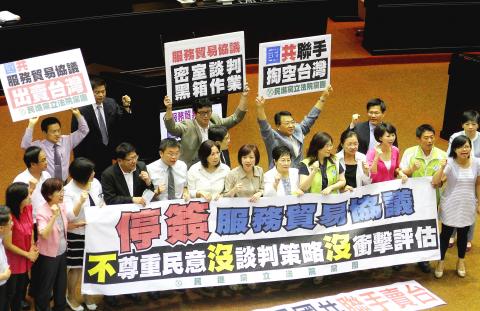Pan-green lawmakers occupied the floor of the legislative chamber yesterday morning with placards reading “the Chinese Nationalist Party [KMT] and the Chinese Communist Party [CCP] are hollowing out Taiwan’s [economy]” to protest the cross-strait service trade agreement that was signed yesterday afternoon.
As a result of the boycott, the plenary session, which had been scheduled to review a number of bills, was forced to adjourn until Tuesday.
“We paralyzed the meeting because the cross-strait service trade agreement was a backroom deal. We must reveal the truth to the public,” Taiwan Solidarity Union legislative caucus whip Hsu Chung-hsin (許忠信) said.

Photo: CNA
Hsu said the party demanded that the agreement be sent to the legislature for approval, not just for the record, and that Premier Jiang Yi-huah (江宜樺) present the agreement to the legislature to discuss its benefits and drawbacks with lawmakers.
“The agreement cannot become effective unless the legislature rectifies it,” Hsu said.
The Mainland Affairs Council had said that it would only submit the agreement on service trade to the legislature for record after the Executive Yuan approves it, citing Article 5 of the Act Governing Relations between the People of the Taiwan Area and the Mainland Area (台灣地區與大陸地區人民關係條例).
Under the article, cross-strait agreements which do not require any amendments to laws or any new legislation must be submitted to the Executive Yuan for approval and then to the legislature for record.
Legislator Lo Shu-lei (羅淑蕾) was one of the KMT lawmakers who vowed to rigorously review the agreement to assess how it would impact the nation’s service sector.
“Which sectors are likely to be harmed? The government should be open to the public about that,” Lo said.
KMT legislative caucus whip Lai Shyh-bao (賴士葆) said the party would not be against reviewing the trade pact in the legislature.
“We understand why the public has expressed concerns over the agreement. Their concerns need to be addressed,” Lai said.
Democratic Progressive Party legislative caucus whip Pan Men-an (潘孟安) said the agreement would affect the nation in a “destructive” way, with 72 percent of the nation’s service industry which employs 7 million workers being affected by the pact.
“It’s not that we oppose trade normalization with China, but Taiwan could lose its competitive edge as a result of the agreement. There is no shortage of funds, technology or workforce in service sectors in Taiwan,” Pan said.
Meanwhile, the People First Party (PFP) issued a press release saying that the legislature was vested with the power to rectify or abrogate the agreement.
The PFP added that it opposed lifting the cap on Chinese investment in sectors that would devastate local businesses and demanded that the government allocate sufficient funds to help businesspeople upgrade or transform their businesses and to assist local businesses in tapping Chinese markets as complementary measures to reduce negative impacts.
In response to media inquiries, Legislative Speaker Wang Jin-pyng (王金平) said he had no idea which sectors the trade pact would cover because the Mainland Affairs Council has never briefed him on the contents either.

Japanese Prime Minister Sanae Takaichi yesterday lavished US President Donald Trump with praise and vows of a “golden age” of ties on his visit to Tokyo, before inking a deal with Washington aimed at securing critical minerals. Takaichi — Japan’s first female prime minister — pulled out all the stops for Trump in her opening test on the international stage and even announced that she would nominate him for a Nobel Peace Prize, the White House said. Trump has become increasingly focused on the Nobel since his return to power in January and claims to have ended several conflicts around the world,

UKRAINE, NVIDIA: The US leader said the subject of Russia’s war had come up ‘very strongly,’ while Jenson Huang was hoping that the conversation was good Chinese President Xi Jinping (習近平) and US President Donald Trump had differing takes following their meeting in Busan, South Korea, yesterday. Xi said that the two sides should complete follow-up work as soon as possible to deliver tangible results that would provide “peace of mind” to China, the US and the rest of the world, while Trump hailed the “great success” of the talks. The two discussed trade, including a deal to reduce tariffs slapped on China for its role in the fentanyl trade, as well as cooperation in ending the war in Ukraine, among other issues, but they did not mention

REASSURANCE: The US said Taiwan’s interests would not be harmed during the talk and that it remains steadfast in its support for the nation, the foreign minister said US President Donald Trump on Friday said he would bring up Taiwan with Chinese President Xi Jinping (習近平) during a meeting on the sidelines of the APEC Summit in South Korea this week. “I will be talking about Taiwan [with Xi],” Trump told reporters before he departed for his trip to Asia, adding that he had “a lot of respect for Taiwan.” “We have a lot to talk about with President Xi, and he has a lot to talk about with us. I think we’ll have a good meeting,” Trump said. Taiwan has long been a contentious issue between the US and China.

GLOBAL PROJECT: Underseas cables ‘are the nervous system of democratic connectivity,’ which is under stress, Member of the European Parliament Rihards Kols said The government yesterday launched an initiative to promote global cooperation on improved security of undersea cables, following reported disruptions of such cables near Taiwan and around the world. The Management Initiative on International Undersea Cables aims to “bring together stakeholders, align standards, promote best practices and turn shared concerns into beneficial cooperation,” Minister of Foreign Affairs Lin Chia-lung (林佳龍) said at a seminar in Taipei. The project would be known as “RISK,” an acronym for risk mitigation, information sharing, systemic reform and knowledge building, he said at the seminar, titled “Taiwan-Europe Subsea Cable Security Cooperation Forum.” Taiwan sits at a vital junction on